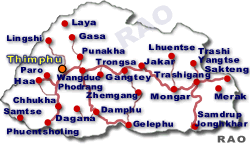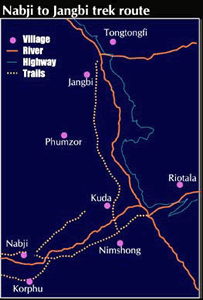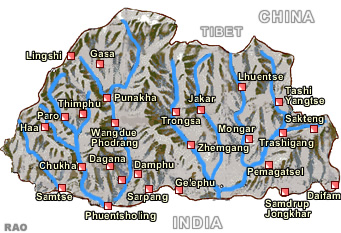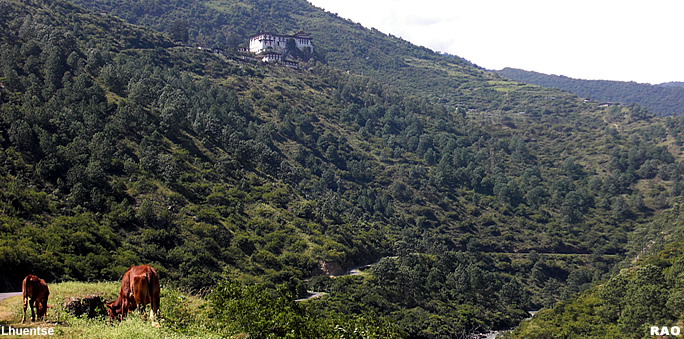| Bhutan
Country Information |
 |
Bhutan Information |
|
|
 |
| Lhuentse
bans brewing of Ara |
 |
Thimphu
officials visiting Singye Dzong in Lhuentse were a bit surprised when locals
offered bottles of Whey (or daw) instead of the usual ara (locally brewed
liquor) as dongchang. Subordinate staff who searched for ara in the vicinity
were politely but firmly refused.
Lhuentse
dzongkhag has officially banned the brewing of ara in all its seven geogs
after the second dzongkhag yargey tshogdue (DYT) meeting in February this
year. |
Offerings
to visitors, home consumption and commercial sale has been completely banned
while use of ara for special religious and social occasions like construction
of new houses, birth and death has come down drastically.
| Community
based tourism: Two new trekking routes |
 |
 |
The
department of tourism (DoT) and the nature conservation division (NCD)
have identified two trekking routes in western central and central Bhutan
as part of pilot project to develop community tourism in the country.
The two trekking routes will form the basis of a study on developing a
proper framework for community based tourism in consultation with the primary
stakeholders or the community members themselves. "Community based tourism",
according to Karma Tshering of the NCD, "is an approach where the local
community is actively involved in its development and management, are able
to derive benefits and enhance income, and promote conservation of nature
and culture". Earlier DOT, NCD and SNV officials presented the findings
of the preliminary feasibility study on the existing ecological and cultural
resources in the selected sites.
The
two routes, from Nabji to Jangbi in Trongsa and Zhemgang and from Phobjikha
to Kamichu in Wangdue and Tsirang were selected for their prominence
as unblemished areas. "They are rich in flora and fauna, which is of interest
to the tourists and lie within Jigme Singye Wangchuck national park," said
DoT director, Lhatu Wangchuk. The Nabji to Jangbi trek starts from 1,000
metres and goes up to 1,500 metres passing through broad leafed sub-tropical
forests. |
It
is a one-week trek and passes through eight villages. The Phobjikha to
Kamechu route is a three-day trek with the route dropping from 2,900 metres
to a much warmer Kamechu at about 600 metres.
Karma
Tshering said that on this route, tourists will be able to see the endangered
golden languor, hornbills and a variety of plants and flowers of which
the most abundant is the Rhododendron.According to a eco tourism specialist,
Charles Giblisco, with the DoT, the new routes will also address the seasonality
problem as they are best suited for trekking between November and April,
the lean tourist season. During summer these routes are infested with leeches
and snakes.
| The
study indicated that the new routes will also help generate additional
income to the local communities. Locals can run lodges, have campsites
within the villages, provide horses for the tourists and also work as guides
since they would be more familiar with the ecosystem of the place. Most
villagers agreed that rendering services to tourists would fetch them additional
income. But some villagers in Phobjikha and Kamechu felt that motor roads
and electricity in their villages was more beneficial than leaving their
environment untouched for tourist attraction.
"I
had a hard time convincing the people about the benefits of the project,"
said one of the surveyors.The second stage of the project will list down
the basic requirement for tourists in the pilot areas and study the possible
socio-economic impact on the local community. |
 |
The
third and final stage will result in tourists visiting the selected sites.
Karma Tshering said that the main purpose of the project was to change
the outlook of the community towards tourists 'from strangers to guests'.
"And this can only be possible with the involvement of the community whereby
they benefit."Meanwhile the start of the second phase is yet to be decided.
| Information on Bhutan |
 |
|







